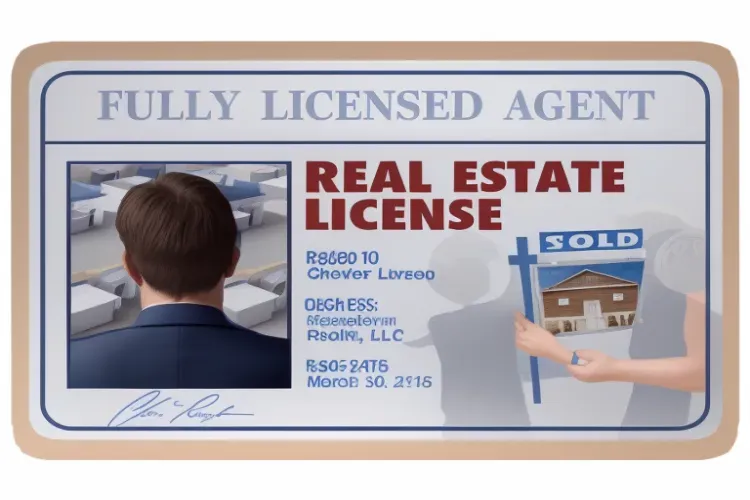Why You Should Get a US Real Estate License
To get a US Real Estate License is the only way to be considered a licensed real estate agent in the United States. It’s not as hard as it sounds, and in this article, we’ll help walk you through the 8 steps needed to get a US Real Estate License. Let’s get going!

Step 1. Know The State Requirements
Getting your real estate license starts with knowing what your state wants. Each state has its own rules for becoming a real estate agent.

Step 2: Take a Pre-Licensing Course
To become a real estate agent, you first need to learn the ropes. Enrolling in a pre-licensing course is your next big step. This course prepares you for the exam and teaches you about selling houses. Here’s how to get started:
Here is a table with the number of pre-licensing education hours required for a real estate license in each U.S. state:
| # | State | Hours Required | # | State | Hours Required |
|---|---|---|---|---|---|
| 1. | Alabama | 60 | 27. | Nebraska | 60 |
| 2. | Alaska | 20 | 28. | Nevada | 90 |
| 3. | Arizona | 90 | 29. | New Hampshire | 40 |
| 4. | Arkansas | 60-90* | 30. | New Jersey | 75 |
| 5. | California | 135 | 31. | New Mexico | 90 |
| 6. | Colorado | 168 | 32. | New York | 75 |
| 7. | Connecticut | 60 | 33. | North Carolina | 75 |
| 8. | Delaware | 99 | 34. | North Dakota | 90 |
| 9. | Florida | 63 | 35. | Ohio | 120 |
| 10. | Georgia | 75 | 36. | Oklahoma | 90 |
| 11. | Hawaii | 60 | 37. | Oregon | 150 |
| 12. | Idaho | 90 | 38. | Pennsylvania | 60-180* |
| 13. | Illinois | 90 | 39. | Rhode Island | 45 |
| 14. | Indiana | 90 | 40. | South Carolina | 60 |
| 15. | Iowa | 60 | 41. | South Dakota | 116 |
| 16. | Kansas | 60 | 42. | Tennessee | 90 |
| 17. | Kentucky | 96 | 43. | Texas | 180 |
| 18. | Louisiana | 90 | 44. | Utah | 120 |
| 19. | Maine | 55 | 45. | Vermont | 40 |
| 20. | Maryland | 60 | 46. | Virginia | 60 |
| 21. | Massachusetts | 40 | 47. | Washington | 90 |
| 22. | Michigan | 40 | 48. | West Virginia | 90 |
| 23. | Minnesota | 90 | 49. | Wisconsin | 72 |
| 24. | Mississippi | 60 | 50. | Wyoming | 54 |
| 25. | Missouri | 72-96* | 51. | ||
| 26. | Montana | 60 | 52. |
This data is based on the most recent available information, but pre-licensing education requirements can change, so it’s advisable to verify with the real estate commission in the specific state.

Step 3: Real Estate Licensing Exam
Getting ready to apply for your real estate licensing exam is a big step. You need to make sure you have all the right info and documents.
Here’s what to do below:

Step 4: Passing Your Exams
Passing your real estate license exam is a big step. You need to score at least 70% to pass in many places. Here are some tips to help you:

Step 5: Apply for Your Real Estate License
So you’ve passed your real estate exam. Great job! Now, it’s time to apply for your real estate license. This is a big step. It may feel like a lot to do, but we’ll break it down for you.
- Get together all your paperwork. You’ll need proof that you finished your pre – license education and passed the exam. Also, grab your identification documents.
- Fill out the application form from your state’s real estate commission. Each state has its own form, so make sure you have the right one.
- Pay attention to background checks. Most places will want one before they give you a license. You might need to get fingerprinted too.
- Check if you need E&O insurance now or later. This insurance helps protect you if someone says you made a mistake while working as an agent.
- Pay the application fees. Remember, these can be between $50 and $250, depending on where you live.
- Send in your application package to the state real estate commission or board that gives out licenses in your area.
- Wait for approval. This can take some time as they check over everything you sent them.

Step 6: Look for a Real Estate Brokerage
Getting your real estate license is a big step. Next, you need to find a place to work. Here are some key points:

Step 7: Join the National Association of Realtors (NAR)
Joining the National Association of Realtors (NAR) is a big step in your real estate journey. It’s not just about having a title—it opens doors to tools and perks that can boost your career.
- Get the title of Realtor – Once you join, you can call yourself a Realtor. This title shows clients and others that you follow high professional standards.
- Access Multiple Listing Services (MLS) – Being part of NAR lets you use MLS listings. These listings are where all the home sales info lives. You need this to do well in real estate.
- Use of NAR Tools – NAR has tools and data just for members. These help you understand the market better.
- Educational Resources – You get more learning options with NAR. They offer courses that can make you a better agent.
- Networking Opportunities – Meet other real estate pros at NAR events. This can lead to new business chances.
- Discounts on Services – Members get discounts on things like insurance and software.
- Advocacy Support – NAR fights for policies that help realtors and homeowners.
So, joining NAR is more than a membership—it’s a way to grow your skills, find new opportunities, and give your clients the best service.

Step 8: Never Forget Real Estate License Renewals
Getting your real estate license is just the start. To keep working as an agent, you must renew your license often. Usually, this happens every two or four years. Here’s how you do it:
How Long Does It Take To Get A U.S. Real Estate License?
Sure, stepping into the real estate world requires some planning, especially around costs and time. Here’s a breakdown to help you get a handle on what to expect:
| Aspect | Cost Range | Time Needed |
| Pre-licensing Education | $200 – $600 | 3-6 months |
| Application Fees | $50 – $150 | Varies |
| Fingerprinting and Background Checks | $50 – $100 | 1-3 weeks |
| State Licensing Exam | $100 – $300 | 1 day (plus study time) |
| License Fees | $100 – $400 | Varies |
Money-wise, becoming a licensed real estate agent can set you back a few hundred to over a thousand dollars. You’ll spend this on courses, applying, and taking tests. Time-wise, you’re looking at about three to six months to get through it all.
Courses can be online or in person. Each state has its own rules on what you need to learn. After classes, apply for your test. Pass it, and then you can apply for your US Real Estate license.
Remember, costs vary by state. Also, how you choose to learn can change the cost. Online might be cheaper than in-person classes.
Pros and Cons of Getting a U.S. Real Estate Agent License
Pros
Cons
Tips for Success in Your Real Estate Career
Always keep learning. The real estate world changes fast. So, taking courses and attending workshops can help you stay ahead. This is not just about knowing the latest trends. It’s also about understanding your state’s specific rules and how to use new technology that makes your job easier.
Build strong relationships. In real estate, who you know is key. Make connections with other agents, clients, and people in your community. Use social media to share helpful tips and show what makes you different from others selling homes.
Good relationships mean more people will think of you when they want to buy or sell a house. And happy clients often tell their friends about you too! Who knows, your name might someday be on our lists here soon at Realty Lists Hub!
FAQs
1. How do I start to get a real estate license?
First, you’ll need to take a real estate course that meets your state’s requirements. After finishing the course, pass the real estate exam in your state.
2. Can I use my license in another state?
It depends on if there’s a reciprocity agreement between states. Some states let you transfer your license easily, while others may have different rules.
3. What does continuing education mean for real estate agents?
After getting licensed, agents must complete ongoing education courses. These keep them informed and up-to-date with laws and practices.
4. Do all states require the same steps to become an agent?
Nope! Each state has its own set of rules for becoming a licensed agent – from the type of courses you need to how many hours you study.
5. What should I do after passing my licensing exam?
Find a broker willing to hire new agents; they’ll help guide you as you start your career… Also remember to submit any final applications or paperwork required by your state’s real estate commission.





Leave a Reply